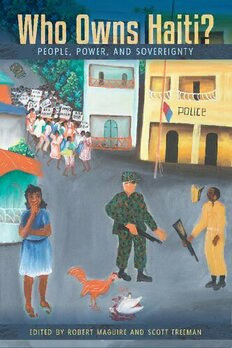
Who Owns Haiti?: People, Power, and Sovereignty PDF
Preview Who Owns Haiti?: People, Power, and Sovereignty
Who Owns Haiti? University Press of Florida Florida A&M University, Tallahassee Florida Atlantic University, Boca Raton Florida Gulf Coast University, Ft. Myers Florida International University, Miami Florida State University, Tallahassee New College of Florida, Sarasota University of Central Florida, Orlando University of Florida, Gainesville University of North Florida, Jacksonville University of South Florida, Tampa University of West Florida, Pensacola Who Owns Haiti? PEOPLE, POWER, AND SOVEREIGNTY Edited by Robert Maguire and Scott Freeman Foreword by Amy Wilentz University Press of Florida Gainesville / Tallahassee / Tampa / Boca Raton Pensacola / Orlando / Miami / Jacksonville / Ft. Myers / Sarasota Copyright 2017 by Robert Maguire and Scott Freeman All rights reserved Printed in the United States of America on acid-free paper This book may be available in an electronic edition. 22 21 20 19 18 17 6 5 4 3 2 1 Library of Congress Cataloging-in-Publication Data Names: Maguire, Robert E. (Robert Earl), 1948– editor. | Freeman, Scott (lecturer), editor. Title: Who owns Haiti? : people, power, and sovereignty / edited by Robert Maguire and Scott Freeman ; foreword by Amy Wilentz. Description: Gainesville : University Press of Florida, 2017. | Includes bibliographical references and index. Identifiers: LCCN 2016035948 | ISBN 9780813062266 (cloth) Subjects: LCSH: Haiti—Politics and government—1986– | Self-determination, National—Haiti. | Haiti—History. Classification: LCC F1928.2 .W47 2017 | DDC 972.94—dc23 LC record available at https://lccn.loc.gov/2016035948 The University Press of Florida is the scholarly publishing agency for the State University System of Florida, comprising Florida A&M University, Florida Atlantic University, Florida Gulf Coast University, Florida International University, Florida State University, New College of Florida, University of Central Florida, University of Florida, University of North Florida, University of South Florida, and University of West Florida. University Press of Florida 15 Northwest 15th Street Gainesville, FL 32611-2079 http://upress.ufl.edu Contents List of Illustrations vii Foreword ix Amy Wilentz Acknowledgments xix List of Abbreviations xxi 1. Introduction: Sovereignty and Ownership from the Inside and Out 1 Scott Freeman and Robert Maguire 2. Haitian Sovereignty: A Brief History 16 Laurent Dubois 3. Haiti and the Limits of Sovereignty: Trapped in the Outer Periphery 29 Robert Fatton Jr. 4. New Wine in Old Bottles: The Failure of the Democratic Transition in Haiti 50 Francois Pierre-Louis Jr. 5. Brazilian and South American Political and Military Engagement in Haiti 67 Ricardo Seitenfus 6. Who Owns U.S. Aid to Haiti? 85 Robert Maguire 7. Who Owns the Religion of Haiti? 106 Karen Richman 8. Sovereignty and Soil: Collective and Wage Labor in Rural Haiti 125 Scott Freeman 9. Street Sovereignty: Power, Violence, and Respect among Haitian Baz 140 Chelsey Kivland 10. Conclusion: Reflections on Sovereignty 166 Robert Maguire, Scott Freeman, and Nicholas Johnson List of Contributors 177 Index 181 Illustrations Figures Frontis. Map of Haiti ii 2.1. Painting by Dominique Fontus 27 6.1. Government of Haiti–U.S. government strategic alignment 90 6.2. Haiti’s development corridors 91 8.1. Contour canals dug on a hillside in southwest Haiti 129 9.1. Graffiti at Baz Grand Black 148 9.2. Baz Grand Black headquarters 151 9.3. Baz MOG 153 9.4. Description of an OJMOTEEB project 154 Tables 5.1. Characteristics of the principle of nonindifference 73 5.2. Latin American composition of MINUSTAH by country 73 Foreword Amy Wilentz Ever since I first began thinking about Haiti, the question this book addresses has been a focus of my investigations, no matter which book or story I was working on. Ownership is the core question at the heart of Haitian and, indeed, of all African American history. Of course the question of sovereignty is para- mount for any entity that calls itself a state, but there is also an undercurrent in Haitian domestic politics and in foreign policy toward Haiti that is constantly posing the foundational question for the Haitian nation. That question is not just who owned and who owns Haiti, but who owns the Haitians themselves. Who owns the government, who owns le terroir, who owns the people? Are Haitians the masters of their fates, either as citizens or as individuals? Who controls their destiny? I arrived in Haiti for the first time at the end of January 1986 and witnessed the fall of the Duvalier dynasty that year. Since then, I’ve watched a variety of regime changes there, many of them including elections, some not. Dur- ing almost all these relinquishings and takings of power, the manipulations and counsel of the United States (and the other “friends” of Haiti, like France, Canada, the Vatican, and especially the UN) were an extremely important (if not the most important) factor. During each regime change, the United States worked to find the candidate most acceptable to business actors in Haiti and their friends and associates abroad. These candidates were usually moderates or conservatives, often English-speaking, who had international connections and were expected to stay an economic course that would help the export-import sector as well as maquiladora owners and large landholders. The exceptions to this rule were the elections of Jean-Bertrand Aristide and (to a lesser degree) René Préval, who slipped around the American strategy on a huge wave of popular support. Aristide’s course through the sieve of U.S. pol- icy for Haiti provided evidence of how far the Americans were willing to go to
